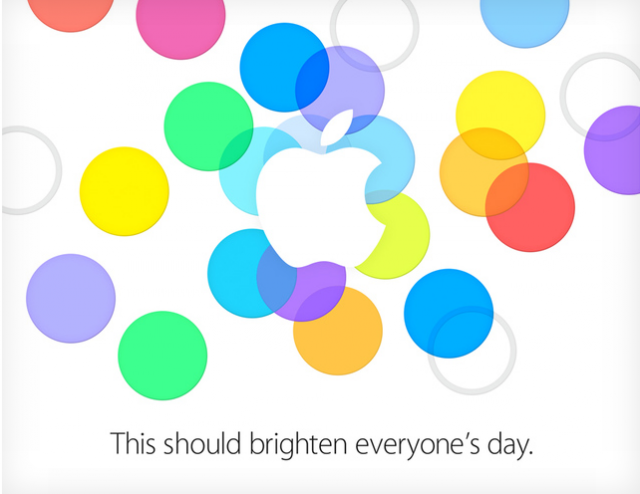
Apple's next event is official, and it's probably going to be about iPhones.
Apple
On September 10, Apple will host its first major event since its Worldwide Developers Conference (WWDC) back in June. Unlike that event, which revolved around mostly product announcements and not product launches, Tuesday's keynote "should brighten everyone's day" with a bunch of shiny new stuff.
This list isn't comprehensive, but it should encompass all of the major announcements that Apple could make. We'll also share just how likely we think those announcements are.
iOS 7: Definitely
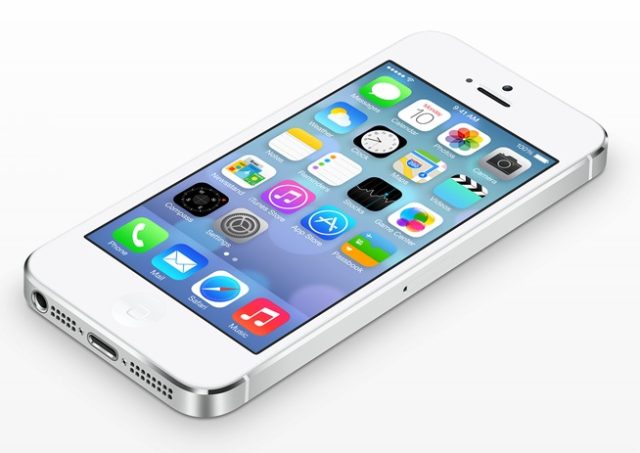
A release date for iOS 7 will be one of the largest announcements we get from the show. While iOS 6 was all about spit-and-polish, iOS 7 is the most extensive redesign Apple's mobile operating system has gotten since its introduction in 2007. It brings new features, new APIs, and a brand new design that sheds faux-realistic textures in favor of flatter, brighter colors and gradients. The new operating system will support the iPhone 4, 4S, and 5; the fifth-generation iPod touch; and the iPad 2, iPad mini, and both Retina iPads. It's the end of the line for both the iPhone 3GS and the fourth-generation iPod touch (though there have been rumblings that the iPad builds may not be ready at the same time as the iPhone and iPod builds).
We'll be doing a deep dive into all of the new stuff in our full review, but what's important now is when we'll actually be getting the software. Apple is a company that adheres to its own traditions pretty closely, so let's look at the release dates for the last two major iOS updates. Both iOS 5 and iOS 6 were released on the Wednesday before the iPhone 4S and iPhone 5 (respectively), and those phones were released on the second Friday after they were announced. Assuming Apple doesn't break tradition, the public should be able to get its hands on the newest version of iOS on September 18.
New iPhone(s): Definitely
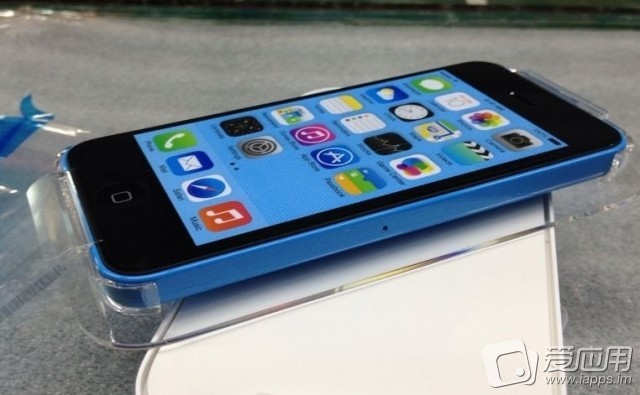
An (alleged) photo of the (alleged) iPhone 5C.
All signs point to Apple releasing not one, but two new iPhones to go along with its new software. The first, widely believed based on leaks and past upgrades to be called the "iPhone 5S," appears to be in the vein of the previous 3GS and 4S upgrades. It ought to be outwardly similar to last year's iPhone 5 but with a few key upgrades, not limited to a faster system-on-a-chip (SoC). Other persistent rumors suggest a fingerprint sensor embedded into the Home button, a slow-motion video capture mode, an upgraded camera with a dual-LED flash, and a new gold (or "champagne") color option.
If you're looking for a substantial redesign to Apple's flagship (with features including but not limited to a larger screen), you'll have to wait and see if they're introduced next year. Apple's iPhone releases so far have made it clear that the company designs its flagships for the people who upgrade when their two-year contracts are up. If this "iPhone 5S" pans out as it's expected to, it will be less for the iPhone 5 users among you and more for the people still toting an iPhone 4 or 4S.
Apple is also widely expected to introduce a new kind of iPhone alongside its new flagship: an iPhone 5 variant usually referred to as the "iPhone 5C." The phone is expected to share many of its core specifications, including its 4-inch 1136×640 display and A6 SoC, with the iPhone 5. The main difference will be in the phone's body, which will be constructed of plastic instead of metal and available in several bright (almost iPod-esque) colors.
As we outlined a couple of months back, introducing a new iPhone tailored for the middle of the market would give Apple some newfound flexibility in its lower-end products. If it wants to introduce new features like a larger screen size or a new connector in its flagship, it doesn't have to wait two years for those features to proliferate across the entire product line. Using materials like plastic instead of glass and aluminum also presents Apple with the opportunity to reduce costs and increase margins, which is fine as long as build quality doesn't suffer (Apple has made plenty of perfectly good products from plastic in the past).
What we don't know much about at this point is price. It's probable that the so-called iPhone 5S will start at the same $199-with-contract as the current iPhone 5, and that the "iPhone 5C" will start at the $99- or free-with-contract price currently occupied by Apple's older phones, but we'll need to wait to see for sure. As we mentioned, we'd pick September 20 as the launch date in the office pool if we were you (though we're not responsible for anything you lose if we happen to be wrong).
OS X 10.9: Likely
Apple's newest version of OS X, codenamed "Mavericks," shared the stage with iOS 7 back at WWDC. New developer betas have been appearing at a rapid clip since. Even if we don't get a final version of the software that day, a release date seems likelyâ€"at this point, iOS 7 and OS X share enough of the same features and services that it makes sense to update them in near-lockstep.
In addition to moving OS X away from big cat-themed names for the first time since its launch over a decade ago, Mavericks should usher in improvements to battery life, better multi-monitor support, and a number of under-the-hood improvements aimed at reducing resource usage. Even if Apple doesn't introduce Mavericks alongside new Macs at this event, that's OKâ€"OS X 10.9 should run on any Mac that is currently supported by OS X 10.8, and some of the models on that list are over six years old.
iTunes Radio: Likely
Apple said at WWDC that its Pandora-like iTunes Radio service would be launching in the fall, and the launch of some new iPhones (and iOS 7) gives Apple a prime opportunity to open the service up for business. The media deals needed to start the service appear to be in place, and Apple's September event was once synonymous with music in general and iTunes specifically.
New iPads: Possibly
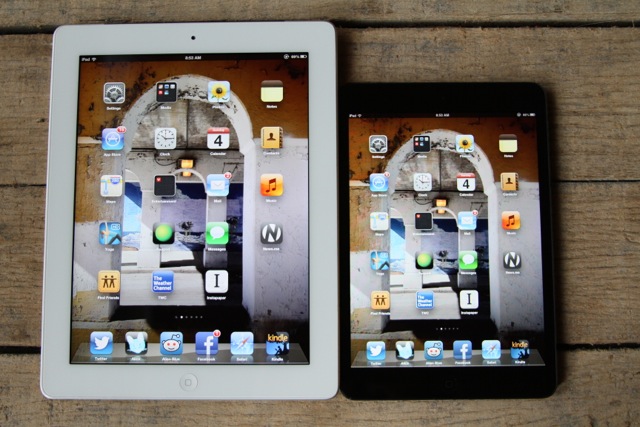
Full-size iPad on the left, iPad mini on the right.
Jacqui Cheng
Apple refreshed its Retina iPad and introduced the iPad Mini almost a year ago, and the probable announcement of iOS 7 does present an opportunity to refresh most of the lineup. If you're relaunching your software, why not take the opportunity to relaunch all of your hardware too?
Well, two things: first, Apple had a separate iPad event in October last year, and Apple's love of tradition (combined with some rumor mill churning) means that they might have one again. The argument in favor of a separate event is that, like the iPhone, the iPad line is currently one of Apple's growth-driving cash cows. Apple generally sculpts an event around high-profile products like the iPad, keeping the big announcements far enough away from one another that news about the iPhone doesn't overshadow the iPad and vice versa. Apple could announce new iPads on Tuesday, but we think the iPad and the iPhone are each too big to share a stage.
That said, plenty of rumors and component leaks are pointing to a refresh that's happening soon even if it isn't happening imminently. Nearly all of the leaks agree that the fifth-generation iPad will go on a diet, picking up thinner iPad mini-esque bezels and shedding some weight and thickness for the first time since the original Retina iPad was launched a year and a half ago. The smaller iPad is prompting larger questionsâ€"namely, will it include a Retina display or not? High-resolution tablets like the 2013 Nexus 7 (and displays like this 5.5-inch 2560×1440 number from LG) suggest that it is technically possible, but history suggests that Apple will only upgrade the screen if it won't tank the battery life or add significantly to the tablet's size or weight.
New Macs: Possibly
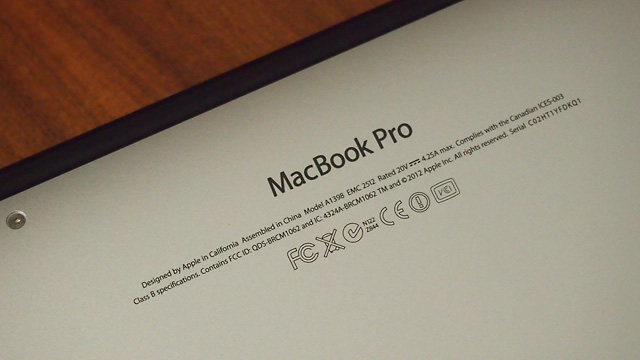
Chris Foresman
At this point, pretty much every Mac except the MacBook Air is nearly due (or past due) for a Haswell-flavored refresh. With a few exceptions, Apple doesn't use Mac products as headliners of late, opting to refresh them one or two at a time as part of separate events throughout the year.
The most anticipated Mac of them all (at least among a certain subset of Apple buyers) will be the Mac Pro, which is getting its first major update in three years sometime "this fall." While we doubt that Tim Cook will get up on stage and announce that the new workstation will be ready to drop into our laps on September 10, it could be the case that we at least get a more specific release date for the computer.
As for new Retina MacBook Pros, Mac Minis, or iMacs, they could all go either wayâ€"none of the computers are due for a design overhaul, which should prevent the sort of manufacturing snags that supposedly delayed last year's new iMacs. All of the CPUs and GPUs Apple is likely to use are available to buy right now. Every one of the systems is around a year old. In the absence of any convincing chatter one way or the other, Apple could really announce a refresh for anything at any time (though if we had to guess, we'd expect a new Mac Mini and new MacBook Pros before we'd expect new iMacs, since their latest refresh didn't ship until very late in 2012). New Macs are also a prime candidate for a hypothetical October event, should one happen this year.
New iPods: Unlikely
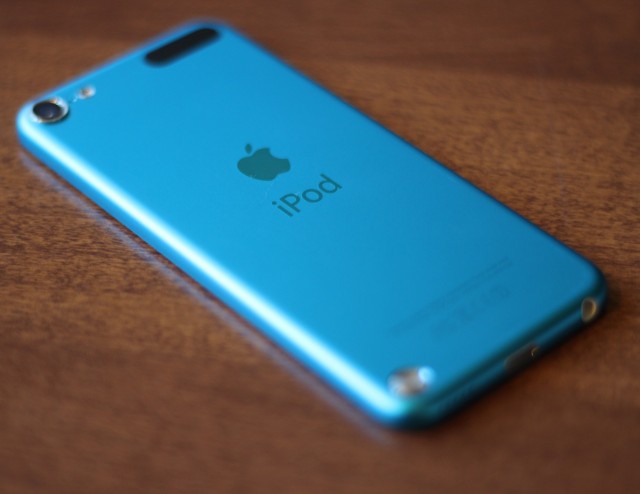
The iPod touch could get faster, but it's more likely to stay the same.
Andrew Cunningham
It was once the case that Apple's September events were its music events. The stage didn't belong exclusively to iTunes or the iPod, but as late as 2010 those product lines were the linchpin. In 2011 the event was bumped to October, and it focused overwhelmingly on the iPhone 4S. The previous year's iPods were given a fresh coat of paint but not replaced by all-new hardware. In 2012, we got a new iPod touch and new iPod nano, but they again shared the stage with a new iPhone.Â
We think this will be another off-year for the iPod. We may see some new price points, software features, or storage capacities, but given that the lineup is an ever-smaller portion of Apple's revenue pie (and that the fourth-generation iPod touch was silently replaced over the summer) it seems unlikely that we'll see any all-new hardware. The iPod continues to sell, but it makes sense to fall back to a more relaxed, two-year refresh cycle given their diminishing importance to the bottom line.
It does seem distinctly possible that the iPod classic will be retired this year, especially if the company is making a concerted effort to remove the old 30-pin connector from its lineup. Only Apple actually knows exactly how well it's selling and whether it's still worth the trouble.
Apple TV and AirPort Express: Unlikely
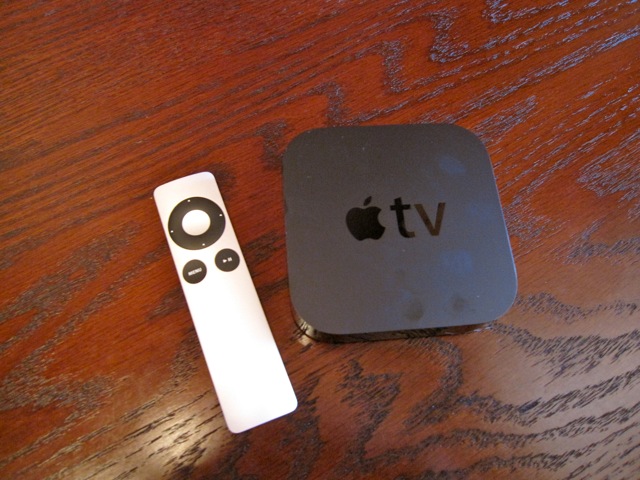
Jacqui Cheng
There are a few other, more minor Apple products that could all see quick-hit refreshes during this event, though these are all small enough products for the company that they could be refreshed independently of a major event. Scattered, sketchy rumors have suggested that we could get both a refreshed Apple TV and an 802.11ac version of the AirPort Express soon, but neither product is in desperate need of improvement.
The Airport Express is Apple's budget router. It was just updated last year, and it tends to have pretty long refresh cyclesâ€"the first- and second-generation AirPort Expresses both lasted about four years before being replaced. Additionally, while dual-band, two-antenna 802.11n isn't going to deliver cutting-edge speeds, putting an 802.11ac chip in there at this point is going to lower Apple's margins (or increase the product's price) while benefitting just a subsection of its users. We would expect that AirPort Express to stay as it is for nowâ€"if you want 802.11ac, grab an AirPort Extreme.
For the Apple TV's part, well, barring some as-yet-unannounced plan to open the platform up to general application and/or game development, the box just doesn't need more processing power to do what it does. Apple also just created a brand-new, Apple TV-specific version of its A5 chip for the set-top box in March. It seems unlikely that it would expend that sort of engineering effort just to throw the current box out in favor of something else six months later. A replacement is possible because anything is possible, but we'd say that Apple will count on new software rather than new hardware to spruce up its set-top box in 2013.
Something never-before-seen: Who knows!
Plenty of pundits and analysts will be looking for Apple to pull a big "one more thing" out of its pockets at this event. Even though the company continues to rake in literally billions of dollars based on established products, its explosive growth in recent years has been driven by all-new product lines and not just successful updates to (and iPad mini-style variations on) old ones. We don't necessarily subscribe to the "what has Apple done for me lately?" school of thought, but we are eager to see the first truly new product from Tim Cook's Apple.
For this last prediction, all we can do is throw our hands up in the airâ€"anything we could even guess at wouldn't just be speculation, it would be speculation without the part leaks and precedent that we can lean on to talk about Apple's existing product lines. Maybe we'll see some wearable computing device. Maybe we'll see the unicorn that is the Apple television set. All we can say for sure is that even though Tim Cook has promised "products that will blow your mind," Apple usually doesn't ship stuff until it's ready to ship it. Whatever surprises the company has up its sleeve, we'll be there to cover them on Tuesday, and we'll be just as surprised as the rest of you.
No comments:
Post a Comment